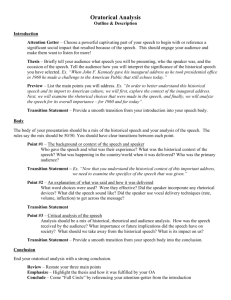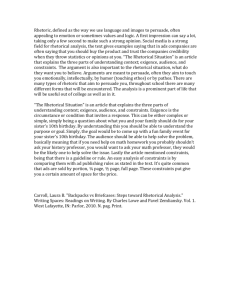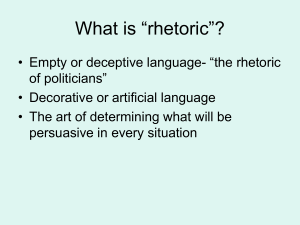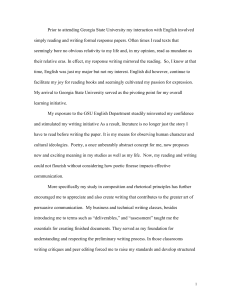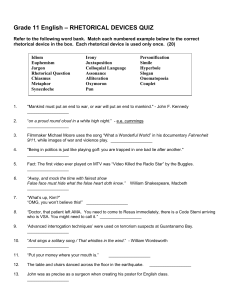Studying Speeches
advertisement
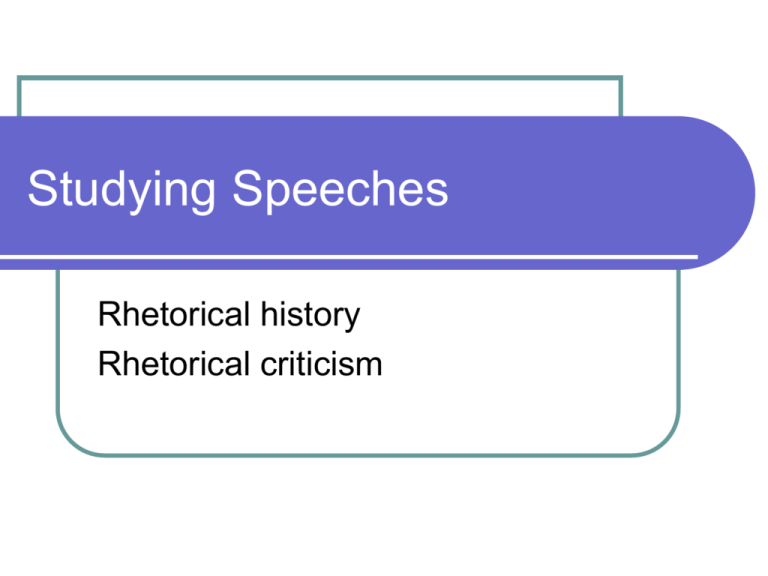
Studying Speeches Rhetorical history Rhetorical criticism Definition: Rhetoric The use of the resources of language to shape response to a public situation. Rhetoric responds to situations Situations are public situations Rhetoric concerns responses to situations; shape action Rhetoric involves the use of language in response Rhetoric is strategic: goal seeking Powers of Rhetorical Message Assembles relevant elements of context Creates a flow of events (Understanding) Creates a value structure for events Sequences Theory of causes Things that are deplorable (unfriendly) Things that are inviting (friendly) Motivates particular response Rationalizes response Organizes response Powers of language: 9/11 Assembles relevant elements of context Creates a flow of events (Understanding) Caused by “hatred of our freedom”; “exploited our <freedoms>” Creates a value structure for events Who did it? Why? Like Pearl Harbor? Came as students; Resistance on United flight 93; Al Qaeda training bases in Afghanistan Not: Impact of American policy on motivation; failures of our defenses; Why these buildings?; our cultural differences with attackers; Impact of American entertainment media “Evil actions, done by evil people” Innocent victims Motivates particular response Must defend ourselves Afghanistan as target A Model of Rhetorical Response . . . Draws elements from context . . . A rhetorical message . . . . . . into an understanding to shape a response. As a public we demand leaders speak . . . They clarify events for us They provide us an account of what happened They guide us to a public response They inspire us to commit to that response Inaugural Addresses Rituals provided to leaders to define our time Name the time as they see it They provide a mosaic of values Declare their commitment to responses to that time Understanding Rhetorical Moments Bitzer’s account of rhetorical situation Exigence: Problem demanding response Audience: The public the spkr addresses Constraints: resources available to spkr Limiting elements Opportunities Speaker makes choices: fitting or unfitting We judge the speaker’s rhetorical act: a fitting response to rhetorical situation or not Understanding Rhetorical Moments Bitzer’s account of rhetorical situation Exigence: Situation group & Historical context group Audience: Situation group Constraints: Biography group, Situation group, Historical Context group Speaker makes fitting choices: Response group We judge the speaker’s rhetorical act: a fitting response to rhetorical situation or not Rhetorical History as Context We study several factors: What exigence created the rhetorical moment? What did the speaker draw upon in his rhetorical response? What did s/he not choose to recognize? (constraints or choices from context) History of the times; broader historical understanding What characteristics of the speaker helped shape his/her response? (personal constraints) Short term history Biography Training in speaking How did the speech shape public response? Response to the speech Brockriede’s Criticism Criticism: passing judgment on experience: Evaluative for better understanding of experience: Explanation Argument: 5 characteristics 1. 2. 3. 4. 5. From known to unknown Reason to believe the unknown Choice among competing judgment/explanation Probable, not certain Willingness to be wrong Brockriede’s Criticism Criticism: passing judgment for better understanding Argument 1. 2. 3. 4. 5. known to unknown Reason to believe Competing judgment/explanation Probable, not certain Willingness to be wrong George Bush first considered the events a crime subject to investigation, then an act of war subject to military action. George Bush had little choice but to go to war after media had framed events as Pearl Harbor. Brockriede’s Criticism Claim Your inferential leap What you seek to prove Make a significant claim Description not enough Classification (labeling) not enough Significant claim has characteristic of argument Brockriede’s Criticism Claim Your inferential leap What you seek to prove Make a significant claim Description not enough Classification (labeling) not enough Significant claim has characteristic of argument George Bush first considered the events a crime subject to investigation, then an act of war subject to military action. George Bush had little choice but to go to war after media had framed events as Pearl Harbor. Brockriede’s “Explanation” Argument How does the speaker gather context, shape it into an understanding, and transform it into motivation? Argument should be Significant claim Well proven Brockriede’s “Evaluation” Argument How well does the spkr respond to the situation? What does the situation require? What resources does the spkr have? What barriers must the spkr overcome? Argument should be Significant claim Well proven Our Agenda for Discussions What in the moment are the demands on the speaker? What strategies does the speaker use to respond? 1. 2. • • What do they respond to in the context? How does he respond to them? How appropriate are the strategies? 3. • • Appropriate for the context? Appropriate for his/her goals? Implications on Your Papers Develop a thesis about the speech and its response to situation 1. • • Explain the speech’s response to situation Evaluate the speaker’s response Support that thesis with your research 2. • • • • Biography of the speaker Historical context Demands of the moment Responses to the speech


